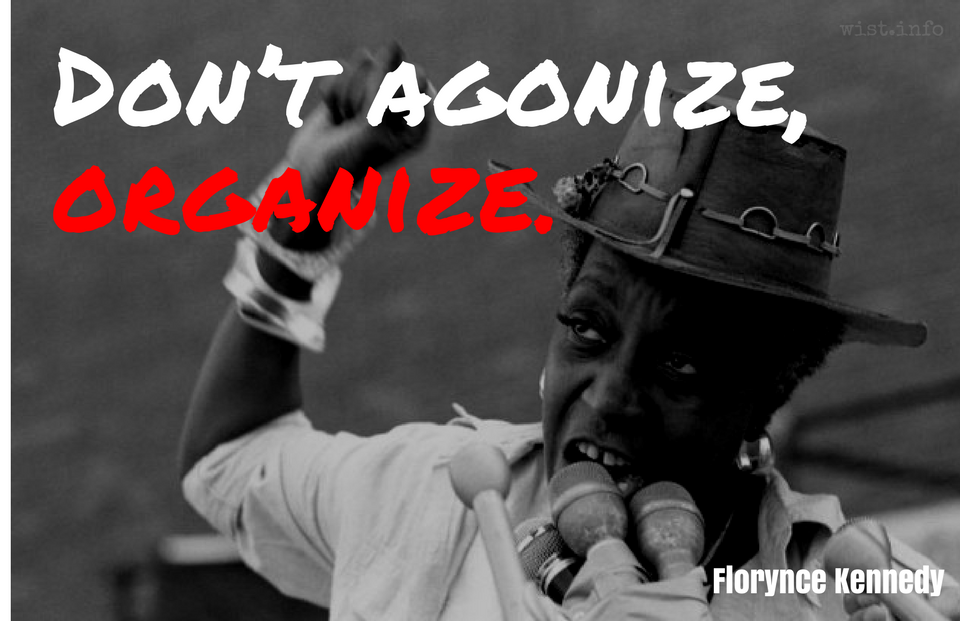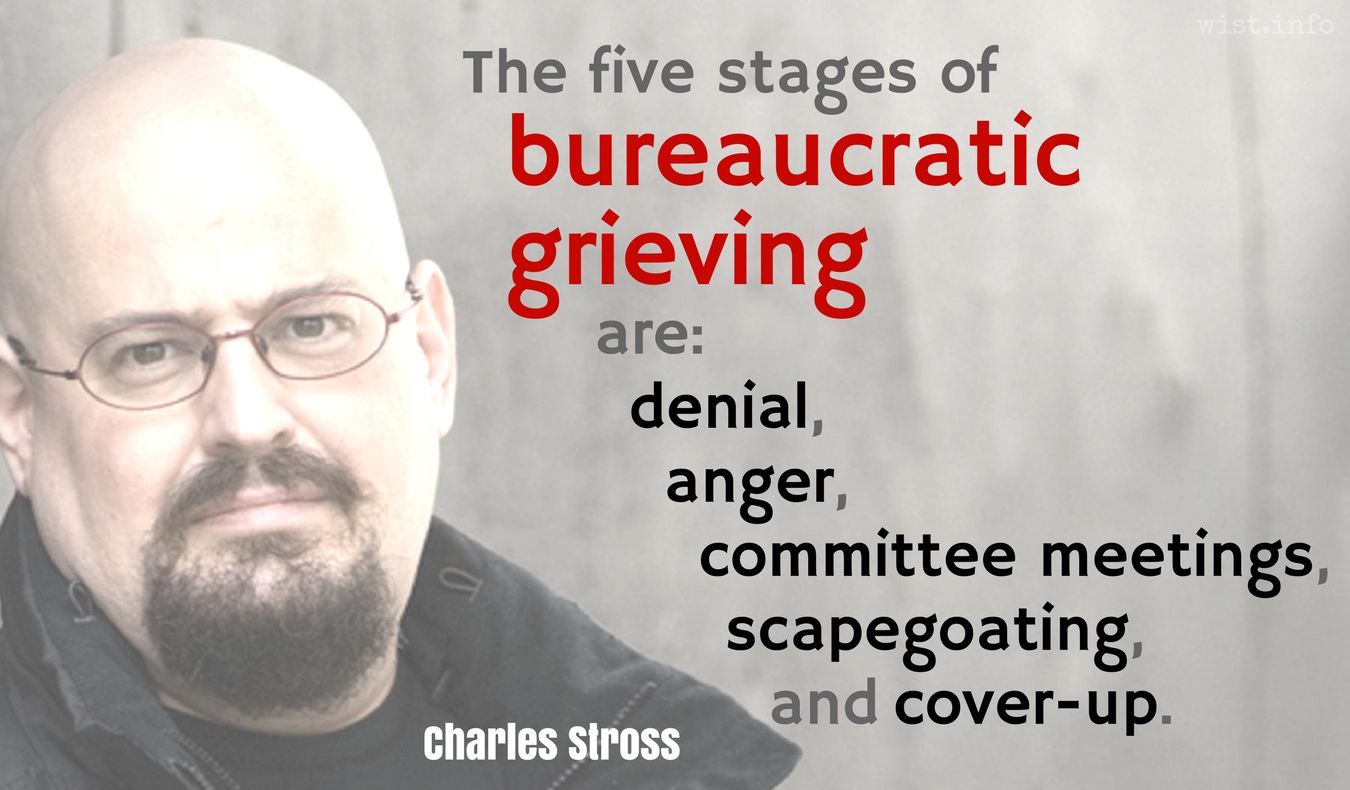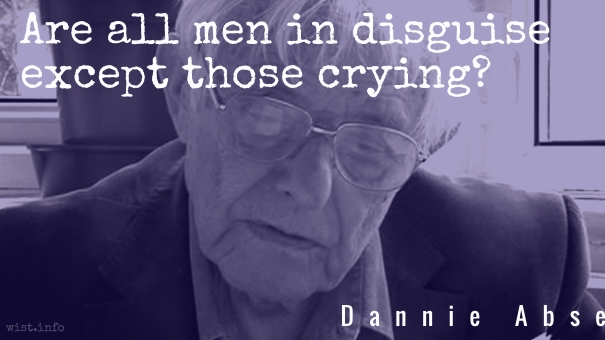BENEDICK: Well, everyone can master a grief but he that has it.
William Shakespeare (1564-1616) English dramatist and poet
Much Ado About Nothing, Act 3, sc. 2, l. 27ff (3.2.27-28) (1598)
(Source)
Quotations about:
grief
Note not all quotations have been tagged, so Search may find additional quotes on this topic.
BALTHAZAR: Sigh no more, ladies, sigh no more,
Men were deceivers ever,
One foot in sea and one on shore,
To one thing constant never.
Then sigh not so, but let them go,
And be you blithe and bonny,
Converting all your sounds of woe
Into Hey, nonny nonny.William Shakespeare (1564-1616) English dramatist and poet
Much Ado About Nothing, Act 2, sc. 3, l. 64ff (2.3.64-71) (1598)
"Hey, nonny nonny" was a nonsense refrain popular in English music during the Elizabethan era; in context here, it means stop grieving over the guy that dumped you and put that effort instead into some merry-making and song. Music historian Ross Duffin believes the form of Balthazar's tune fits a popular song of the Tudor period, "The Lusty Gallant."
Grief can take care of itself, but to get the full value of a joy you must have someone to divide it with.
Mark Twain (1835-1910) American writer [pseud. of Samuel Clemens]
Following the Equator, ch. 48, epigraph (1897)
(Source)
Ye Venuses and Cupids mourn,
Ye whom the graces most adorn,
Come, and your tears of sorrow shed:
My Lesbia’s little bird is dead.[Lugete, o Veneres Cupidinesque
et quantum est hominum venustiorum!
passer mortuus est meae puellae,
passer, deliciae meae puellae.]Catullus (c. 84 BC – c. 54 BC) Latin poet [Gaius Valerius Catullus]
Carmina # 3 “Death of the Sparrow,” ll. 1-4 [tr. Bliss (1872)]
(Source)
(Source (Latin)). Alternate translations:
Mourn all ye Loves! ye Graces mourn!
My Lesbia's fav'rite sparrow's gone!
Ye men for wit, for taste, preferr'd,
Lament my girl's departed bird!
[tr. Nott (1795)]
Mourn, all ye loves and graces; mourn,
Ye wits, ye gallant, and ye gay;
Death from my fair her bird has torn,
Her much-loved Sparrow's snatch'd away.
[tr. Lamb (1821)]
Loves and Graces, mourn with me,
Mourn, fair youths, where'er ye be!
Dead my Lesbia's sparrow is,
Sparrow, that was all her bliss.
[tr. T. Martin (1861)]
Ye Graces! mourn, oh mourn!
Mourn, Cupids Venus-born!
And loveliest sons of earth, where'er ye are !
Dead is now my darling's sparrow --
Sparrow of my "winsome marrow,"
Than her very eyes, oh! dearer to her far.
[tr. Cranstoun (1867)]
Weep each heavenly Venus, all the Cupids,
Weep all men that have any grace about ye.
Dead the sparrow, in whom my love delighted,
The dear sparrow, in whom my love delighted.
[tr. Ellis (1871)]
Weep every Venus, and all Cupids wail,
And men whose gentler spirits still prevail.
Dead is the Sparrow of my girl, the joy,
Sparrow, my sweeting's most delicious toy.
[tr. Burton (1893)]
O mourn, you Loves and Cupids, and all men of gracious mind. Dead is the sparrow of my girl, sparrow, darling of my girl.
[tr. Smithers (1894)]
Mourn, all ye Loves, ye Loves and Cupids, mourn,
Make moan for heaviness, ye gallants bright,
For Lesbia's bird, my Lesbia weeps forlorn;
He's dead -- poor, pretty bird -- my love's delight!
[tr. Harman (1897)]
Mourn, ye Graces and Loves, and all you whom the Graces love. My lady's sparrow is dead, the sparrow my lady's pet.
[tr. Warre Cornish (1904)]
Mourn, all ye Graces, mourn, ye Sons of Love, and all whose hearts engender pity. The sparrow of my beloved is no more; that sparrow, the delight of my beloved.
[tr. Stuttaford (1912)]
Weep, weep, ye Loves and Cupids all,
And ilka Man o’ decent feelin’:
My lassie’s lost her wee, wee bird,
And that’s a loss, ye’ll ken, past healin’.
[tr. Davies (1912)]
Let Venus bow her head in grief,
And tears drown Cupid's eyes in sorrow,
And men of feeling everywhere
Forget to smile -- until tomorrow.
My lady's little bird lies dead,
The bird that was my lady's prize.
[tr. Stewart (1915)]
Weep, ye gods of love and pleasure,
Weep, all all ye of finer clay,
Weep, my darling's lost her treasure,
Mourn her sparrow passed away!
[tr. Symons-Jeune (1923)]
Mourn Loves and Graces all, and you
Of men the lovelier chosen few.
The sparrow of my love is dead,
The playmate of my love is sped.
[tr. MacNaghten (1925)]
Dress now in sorrow, O all
you shades of Venus,
and your little cupids weep.
My girl has lost her darling sparrow.
[tr. Gregory (1931)]
Lament, o graces of Venus, and Cupids,
and cry out loud, men beloved by Her graces.
Pass here, it's dead, meant so much to my girl, the
sparrow, the jewel that delighted my girl.
[tr. Zukofsky (1959)]
Mourn, oh Cupids and Venuses,
and whatever there is of rather pleasing men:
the sparrow of my girlfriend has died,
the sparrow, delight of my girl.
[tr. Sullvan (1997)]
Mourn, O you Loves and Cupids
and such of you as love beauty:
my girl’s sparrow is dead,
sparrow, the girl’s delight.
[tr. Kline (2001)]
Mourn, Cupids all, every Venus,
and whatever company still exists of caring people:
Sparrow lies dead, my own true sweegheart's sparrow.
[tr. Green (2005)]
Mourn, Oh Venuses and Cupids
And all men of finer feeling
The sparrow of my girl has died,
the sparrow, my lady's pet.
[tr. Wikibooks (2017)]
Mourn, O Venuses and Cupids
and however many there are of more charming people:
my girl's sparrow is dead --
the sparrow, delight of my girl.
[tr. Wikisource (2018)]
By those, that deepest feel, are ill exprest
The indistinctness of the suffering breast;
Where thousand thoughts begin to end in one,
Which seeks from all the refuge found in none;
No words suffice the secret soul to show.
And Truth denies all eloquence to Woe.George Gordon, Lord Byron (1788-1824) English poet
The Corsair, Canto 3, st. 22, l. 1807ff (1814)
(Source)
They gave themselves up wholly to their sorrow, seeking increase of wretchedness in every reflection that could afford it, and resolved against ever admitting consolation in future.
He’s the one who gives us wine to ease our pain.
If you take wine away, love will die, and
every other source of human joy will follow.[τὴν παυσίλυπον ἄμπελον δοῦναι βροτοῖς.
οἴνου δὲ μηκέτ᾽ ὄντος οὐκ ἔστιν Κύπρις
οὐδ᾽ ἄλλο τερπνὸν οὐδὲν ἀνθρώποις ἔτι.]Euripides (485?-406? BC) Greek tragic dramatist
Bacchæ [Βάκχαι], l. 772ff [First Messenger/Ἄγγελος] (405 BC) [tr. Woodruff (1999)]
(Source)
Speaking of Dionysus. (Source (Greek)). Alternate translations:
He, the grape, that med'cine for our cares,
Bestow'd on favour'd mortals. Take away
The sparkling Wine, fair Venus smiles no more
And every pleasure quits the human race.
[tr. Wodhull (1809)]
He gives to mortals the vine that puts an end to grief. Without wine there is no longer Aphrodite or any other pleasant thing for men.
[tr. Buckley (1850)]
He hath given the sorrow-soothing vine to man
For where wine is not love will never be,
Nor any other joy of human life.
[tr. Milman (1865)]
He gives the soothing vine
Which stills the sorrow of the human heart;
Where wine is absent, love can never be;
Where wine is absent, other joys are gone.
[tr. Rogers (1872), l. 732ff]
’Twas he that gave the vine to man, sorrow’s antidote. Take wine away and Cypris flies, and every other human joy is dead.
[tr. Coleridge (1891)]
He gave men the grief-assuaging vine.
When wine is no more found, then Love is not,
Nor any joy beside is left to men.
[tr. Way (1898)]
This is he who first to man did give
The grief-assuaging vine. Oh, let him live;
For if he die, then Love herself is slain,
And nothing joyous in the world again!
[tr. Murray (1902)]
It was he,
or so they say, who gave to mortal men
the gift of lovely wine by which our suffering
is stopped. And if there is no god of wine,
there is no love, no Aphrodite either,
nor other pleasures left to men.
[tr. Arrowsmith (1960)]
They say that he
has given to men the vine that ends pain.
If wine were no more, then Cypris is no more
nor anything else delighted for mankind.
[tr. Kirk (1970)]
It was he who gave men the gift of the vine as a cure for sorrow. And if there were no more wine, why, there's an end of love, and of every other pleasure in life.
[tr. Vellacott (1973)]
Didn't he make us
Mortal men the gift of wine? If that is true
You have much to thank him for -- wine makes
Our labors bearable. Take wine away
And the world is without joy, tolerance, or love.
[tr. Soyinka (1973)]
The sorrow-ceasing vine he gives to mortals.
Without wine there is no Aphrodite,
nor longer any other delight for men.
[tr. Neuburg (1988)]
It was he,
so they say, who gave to us, poor mortals, the gift of wine,
that numbs all sorrows.
If wine should ever cease to be,
then so will love.
No pleasures left for men.
[tr. Cacoyannis (1982)]
He himself, I hear them say,
Gave the pain-killing vine to men.
When wine is no more, neither is love.
Nor any other pleasure for mankind.
[tr. Blessington (1993)]
He gave to mortals the vine that stops pain.
If there were no more wine, then there is no more Aphrodite
nor any other pleasure for mankind.
[tr. Esposito (1998)]
It's he who gave
To mortals the vine that stops all suffering.
Adn if wine were to exist no longer, then
Neither would the goddess Aphrodite,
Nor anything of pleasure for us mortals.
[tr. Gibbons/Segal (2000), l. 885ff]
He gave to mortals the vine that puts an end to pain. If there is no wine, there is no Aphrodite or any other pleasure for mortals.
[tr. Kovacs (2002)]
Besides, he's given us the gift of wine,
Without which man desires nor endures not.
[tr. Teevan (2002)]
He’s the god who brought the wine to the mortals. Great stuff that. It stops all sadness. Truth is, my Lord, when the wine is missing so does love and then… well, then there’s nothing sweet left for us mortals.
[tr. Theodoridis (2005)]
He is the one who gave us the vine that gives
pause from pain; and if there is no wine, there'll be no more
Aphrodite, & there is no other gift to give such pleasure to us mortals.
[tr. Valerie (2005)]
He gives to mortal human beings that vine which puts an end to human grief. Without wine, there's no more Aphrodite -- or any other pleasure left for men.
[tr. Johnston (2008)]
He is great in so many ways -- not least, I hear say,
for his gift of wine to mortal men.
Wine, which puts an end to sorrow and to pain.
And if there is no wine, there is no Aphrodite,
And without her no pleasure left at all.
[tr. Robertson (2014)]
When wine is gone, there is no more Cypris,
nor anything else to delight a mortal heart.
[tr. @sentantiq/Robinson (2015)]
He gave mortals the pain-pausing vine.
When there is no wine, Cypris is absent,
And human beings have no other pleasure.
[tr. @sentantiq (2015)]
I’ve heard he gave the grapevine to us mortals, as an end to pain.
And without wine, we’ve got no chance with Aphrodite. Or anything else good, for that matter.
[tr. Pauly (2019)]
He even gives to mortals the grape that brings relief from cares. Without wine there is no longer Kypris or any other delightful thing for humans.
[tr. Buckley/Sens/Nagy (2020)]
He gave mortals the pain-relieving vine.
But when there is no more wine, there is no Aphrodite
Nor any other pleasure left for human beings.
[tr. @sentantiq (2021)]
There’s not a joy the world can give like that it takes away.
Have done at last.
Bow to my appeals. Don’t let your corrosive grief
devour you in silence, or let your dire concerns come
pouring from your sweet lips and plaguing me forever.[Desine iam tandem precibusque inflectere nostris,
ni te tantus edit tacitam dolor et mihi curae
saepe tuo dulci tristes ex ore recursent,
ventum ad supremum est.]Virgil (70-19 BC) Roman poet [b. Publius Vergilius Maro; also Vergil]
The Aeneid [Ænē̆is], Book 12, l. 800ff (12.800-803) [Jove] (29-19 BC) [tr. Fagles (2006)]
(Source)
Jove ordering Juno to stop prolonging the war between the local nations of Italy and the invading Trojans.
(Source (Latin)). Alternate translations:
Give o'er at last, to our intreaties bend,
Nor let such eating grief thee silent spend,
Nor with such care so often trouble me.
[tr. Ogilby (1649)]
At last, in deference to my love, forbear
To lodge within thy soul this anxious care;
Reclin'd upon my breast, thy grief unload:
Who should relieve the goddess, but the god?
[tr. Dryden (1697)]
Now at length desist, and be swayed by my entreaty: nor let such discontent prey upon you in silence; nor let gloomy cares so often meet me from those sweet lips.
[tr. Davidson/Buckley (1854)]
At length give way;
Permit my prayers your will to sway;
Nor brood in silent grief, nor vent
From those sweet lips your ill-content.
[tr. Conington (1866)]
Yield to our prayers, desist thou now at length;
Nor let such grief consume thy silent heart,
Nor from thy sweet lips let these gloomy cares
Encounter me so oft.
[tr. Cranch (1872), l. 1015ff]
Forbear now, I pray, and bend to our entreaties; let not the pain thus devour thee in silence, and distress so often flood back on me from thy sweet lips.
[tr. Mackail (1885)]
I prithee yield unto my prayers, and from thy troubling cease.
Let not thine hushed grief eat thine heart, or bitter words of care
So often from thy sweetest mouth the soul within me wear.
[tr. Morris (1900)]
Desist at length, and hearken to my prayer.
Feed not in silence on a grief so sore,
Nor spoil those sweet lips with unlovely care.
[tr. Taylor (1907), st. 104, l. 928ff]
Give o'er, and to our supplication yield;
let not such grief thy voiceless heart devour;
nor from thy sweet lips let thy mournful care
so oft assail my mind.
[tr. Williams (1910)]
Cease now, I pray, and bend to our entreaties, that such great grief may not consume thee in silence, nor to me may bitter cares so ft return from thy sweet lips.
[tr. Fairclough (1918)]
Stop it now, I tell you;
Listen to my entreaties: I would not have you
Devoured by grief in silence; I would not have you
Bring me, again, anxiety and sorrow,
However sweet the voice.
[tr. Humphries (1951)]
Then yield to my persuasions, give up the long feud now at last!
No more of the hidden rancour that so consumes you, the sullen
Recriminations your sweet lips have troubled me with so often.
[tr. Day-Lewis (1952)]
Stop at last;
give way to what I now ask: do not let
so great a sorrow gnaw at you in silence;
do not let your sweet lips so often press
your bitter cares on me.
[tr. Mandelbaum (1971), l. 1062ff]
Come now, at last
Have done, and heed our pleading, and give way.
Let yourself no longer be consumed
Without relief by all that inward burning;
Let care and trouble not forever come to me
From your sweet lips.
[tr. Fitzgerald (1981), l. 1083]
The time has come at last for you to cease and give way to our entreaties. Do not let this great sorrow gnaw at your heart in silence, and do not make me listen to grief and resentment for ever streaming from your sweet lips.
[tr. West (1990)]
Now cease, at last, and give way to my entreaties,
lest such sadness consume you in silence, and your bitter
woes stream back to me often from your sweet lips.
[tr. Kline (2002)]
She weeps not for her sire if none be near,
In company she calls up many a tear.
True mourners would not have their sorrows known,
For grief of heart will choose to weep alone.[Amissum non flet cum sola est Gellia patrem,
Si quis adest, iussae prosiliunt lacrimae.
Non luget quisquis laudari, Gellia, quaerit,
Ille dolet vere, qui sine teste dolet.]Martial (AD c.39-c.103) Spanish Roman poet, satirist, epigrammatist [Marcus Valerius Martialis]
Epigrams [Epigrammata], Book 1, epigram 33 (1.33) (AD 85-86) [tr. Pott & Wright (1921)]
(Source)
"On Gellia." (Source (Latin)). Alternate translations:
Gellia ne'er mourns her father's loss,
When no one's by to see,
but yet her soon commanded tears
Flow in society:
To weep for praise is but a feigned moan;
He grieves most truly, that does grieve alone.
[tr. Fletcher (1656)]
When all alone, your tears withstand;
In company, can floods command.
Who mourns for fashion, bids us mark;
Who mourns indeed, mourns in the dark.
[tr. Killigrew (1695)]
Gellia alone, alas! can never weep,
Though her fond father perish'd in the deep;
With company the tempest all appears
And beauteous Gellia's e'en dissolved in tears.
Through public grief though Gellia aims at praise,
'Tis private sorrow which must merit raise.
[Gentleman's Magazine (1736)]
Her father dead! -- Alone no grief she knows;
Th' obedient tear at every visit flows.
No mourner he, who must with praise be fee'd!
But he, who mourns in secret, mourns indeed.
[tr. Hay (1755), 1.34]
Sire-reft, alone, poor Gellia weeps no woe:
In company she bids the torrent flow.
they cannot grieve, who to be seen, can cry:
Theirs is the grief, who without witness sigh.
[tr. Elphinston (1782), Book 6, Part 3, ep. 1]
Gellia, when she is alone, does not lament the loss of her father. If any one be present, her bidden tears gush forth. A person does not grieve who seeks for praise; his is real sorrow who grieves without a witness.
[tr. Amos (1858), #95 "Feigned Tears"]
Gellia does not mourn for her deceased father, when she is alone; but if any one is present, obedient tears spring forth. He mourns not, Gellia, who seeks to be praised; he is the true mourner, who mourns without a witness.
[tr. Bohn's Classical (1859)]
He grieves not much who grieves to merit praise;
His grief is real who grieves in solitude.
[ed. Harbottle (1897)]
Gellia weeps not while she is alone for her lost father; is any one be present, her tears leap forth at her bidding. He does not lament who looks, Gellia for praise;' he truly sorrows who sorrows unseen.
[tr. Ker (1919)]
Gellia, alone, ne'er weeps her sire at all;
In company the bidden tears down fall.
True grief is not for admiration shown.
He only weeps indeed, who weeps alone.
[tr. Francis & Tatum (1924), #18, 1.32]
When alone, Gellia never cries for the father she lost.
If someone is with her, tears well up in her eyes,
as if ordered to fall in. If some one looks for praise,
he is not in mourning, Gellia.
He truly mourns
who mourns
alone.
[tr. Bovie (1970)]
In private she mourns not the late-lamented;
If someone's by her tears leap forth on call.
Sorry, my dear, is not so easily rented.
They are true tears that without witness fall.
[tr. Cunningham (1971)]
Gellia does not cry for her lost father when she's by herself, but if she has company, out spring the tears to order. Gellia, whoever seeks credit for mourning is no mourner. He truly grieves who grieves without witnesses.
[tr. Shackleton Bailey (1993)]
Gellia's mourning for her father?
If by herself she doesn't bother.
But when she sees that company lurks
She opens up the waterworks.
She just wants praise for grief that's shown;
They truly grieve who weep alone.
[tr. Ericsson (1995)]
When Janet is sequestered, out of view,
Then never for her father's death she cries.
But let some viewers come, just one or two,
Then tears dramatically flood her eyes.
We know from this how sad in fact she's been:
It is not grief that's only grieved when seen.
[tr. Wills (2007)]
Gellia doesn't weep for her dead father
when she's alone, but tears pour on command
if someone comes. Who courts praise isn't mourning --
he truly grieves who grieves with none at hand.
[tr. McLean (2014)]
Alone, Gellia never weeps over her father's death;
if someone's there, her tears burst forth at will.
Mourning that looks for praise, Gellia, is not grief:
true sorrow grieves unseen.
[tr. Powell]
Life brings no greater grief
Than happiness remembered in a time
Of sorrow.[Nessun maggior dolore
Che ricordarsi del tempo felice
Ne la miseria.]Dante Alighieri (1265-1321) Italian poet
The Divine Comedy [Divina Commedia], Book 1 “Inferno,” Canto 5, l. 121ff (5.121-123) [Francesca] (1309) [tr. James (2013), l. 141ff]
(Source)
Francesca de Rimini is responding to Dante's request to speak of her love affair while in the middle of being punished for it. It is a true (if slanted) tale that occurred when Dante was a young man. Francesca da Polenta wed the crippled Giovanni Malatesta de Rimini, but fell in adulterous love with his brother, Paolo. Upon discovery of their affair, Giovanni killed them both. This was a local scandal, and would have been lost to time if Dante had not recorded it here. He relegates the lovers to the "least" eternal punishment in Hell, in the circle of carnal sins -- while Giovanni (who was still alive when this was written) is doomed to a lower circle for the murder (treachery to kindred). (More info.)
Inspiration for this particular phrase has been credited to many sources: Wisdom 11:11-12, Boethius (Consolation of Philosophy, 2.4.3-6), and Pindar (Pythian 4.510-512) are the most common. Augustine (Confessions 10.14) and Thomas Aquinas have also been cited.
(Source (Italian)). Alternate translations:
No greater grief assails us [...]
Than in unhappy hours to recollect
A better time.
[tr. Rogers (1782)]
Oh! how grievous to relate
Past joys, and tread again the paths of fate.
[tr. Boyd (1802), st. 23]
No greater grief than to remember days
Of joy, when mis'ry is at hand!
[tr. Cary (1814)]
No keener pang hath hell.
Than to recall, amid some deep distress,
Our happier time.
[tr. Dayman (1843)]
There is no greater pain than to recall a happy time in wretchedness.
[tr. Carlyle (1849)]
There is no greater grief
Than to remember happiness in woe.
[tr. Bannerman (1850)]
No greater grief than this,
Mem'ry to hold of the past happy time
In misery.
[tr. Johnston (1867)]
There is no greater sorrow
Than to be mindful of the happy time
In misery.
[tr. Longfellow (1867)]
No greater woe is there than to call to mind the happy time in your misery.
[tr. Butler (1885)]
There is no greater grief
Than to remember us of happy time
In misery.
[tr. Minchin (1885)]
There is no greater woe than in misery to remember the happy time.
[tr. Norton (1892)]
No deeper sorrow is, than to recall a time of happiness, in misery's hour.
[tr. Sullivan (1893)]
There is no greater sorrow
Than to recall to memory times of gladness
In misery.
[tr. Griffith (1908)]
There is no greater pain than to recall the happy time in misery.
[tr. Sinclair (1939)]
No grief surpasses this [...]
In the midst of misery to remember bliss.
[tr. Binyon (1943)]
The bitterest woe of woes
Is to remember in our wretchedness
Old happy times.
[tr. Sayers (1949)]
The double grief of a lost bliss
is to recall its happy hour in pain.
[tr. Ciardi (1954), ll. 118-19]
There is no greater sorrow than to recall, in wretchedness, the happy time.
[tr. Singleton (1970)]
There is no greater pain
than to remember, in our present grief,
past happiness!
[tr. Musa (1971)]
There is no greater sorrow
than thinking back upon a happy time
in misery.
[tr. Mandelbaum (1980)]
There is no greater sorrow
Than to think backwards to a happy time,
When one is miserable.
[tr. Sisson (1981)]
No sadness
Is greater than in misery to rehearse
Memories of joy.
[tr. Pinsky (1994), l. 107ff]
There is no greater pain than to remember the happy time in wretchedness.
[tr. Durling (1996)]
There is no greater pain, than to remember happy times in misery.
[tr. Kline (2002)]
There is no greater pain, I fear,
than to recall past joy in present hell.
[tr. Carson (2002)]
There is no sorrow greater
than, in times of misery, to hold at heart
the memory of happiness.
[tr. Kirkpatrick (2006)]
There is no greater sorrow
than to recall our time of joy
in wretchedness.
[tr. Hollander/Hollander (2007)]
No sadness afflicts the heart
More than recalling, in times of utter disaster,
Sweetened days in which we knew no darkness.
[tr. Raffel (2010)]
What's sadder than remembering
The happy past when you're feeling wretched?
[tr. Bang (2012)]
All changes are more or less tinged with melancholy, for what we are leaving behind is part of ourselves.
Amelia E. Barr (1831-1919) British novelist and teacher.
All the Days of My Life, ch. 6 (1913)
(Source)
See Anatole France.
The pain of grief is just as much a part of life as the joy of love; it is, perhaps, the price we pay for love, the cost of commitment.
Colin Murray Parkes (b. 1928) British psychiatrist and author
Bereavement: Studies of Grief in Adult Life (1972)
(Source)
Sometimes paraphrased, “Grief is the price we pay for love.”
Can I see another’s woe,
And not be in sorrow too?
Can I see another’s grief,
And not seek for kind relief?William Blake (1757-1827) English poet, mystic, artist
“On Another’s Sorrow,” st. 1, Songs of Innocence and of Experience (1789)
(Source)
I will accept that sometimes a villain has to die, but I’ll be damned if I’ll take free drinks for doing it.
Phil Foglio (b. 1956) American writer, cartoonist
Agatha H. and the Clockwork Princess [Barry Heterodyne] (2012) [with Kaja Foglio]
(Source)
The world is indeed full of peril, and in it there are many dark places; but still there is much that is fair, and though in all lands love is now mingled with grief, it grows perhaps the greater.
J.R.R. Tolkien (1892-1973) English writer, fabulist, philologist, academic [John Ronald Reuel Tolkien]
The Lord of the Rings, Vol. 1: The Fellowship of the Ring, Book 2, ch. 6 “Lothlórien” [Haldir] (1954)
(Source)
Study has been for me the sovereign remedy against all the disappointments of life. I have never known any trouble that an hour’s reading would not dissipate.
Charles-Lewis de Secondat, Baron de Montesquieu (1689-1755) French political philosopher
Mes Pensées [My Thoughts] (1720-1755)
Alternate translations:
Study has been to me a sovereign remedy against the vexations of life, having never had an annoyance that one hour's reading did not dissipate.
[Source]
Study has been to me a sovereign remedy against the troubles of life, and I have never had a grief that an hour's reading would not dissipate.
[Source]
This communicating of a man’s self to his friend worketh two contrary effects; for it redoubleth joys and cutteth griefs in Halves. For there is no man that imparteth his joys to his friend, but he joyeth the more; and no man that imparteth his griefs to his friend, but that he grieveth the less.
Francis Bacon (1561-1626) English philosopher, scientist, author, statesman
“Of Friendship,” Essays, No. 27 (1625)
(Source)
Now, do you think this could possibly happen to a wise person, to be subject to distress in this way? That is, to misery? For every emotion is a misery, but distress is a very torture-chamber. Desire scalds us; wild delight makes us giddy; fear degrades us, but the effects of distress are worse: gauntness, pain, depression, disfigurement. It eats away at the mind and, in a word, destroys it. This we must shed; this we must cast away, or else remain in misery.
[Hoc tu igitur censes sapienti accidere posse, ut aegritudine opprimatur, id est miseria? nam cum omnis perturbatio miseria est, tum carnificina est aegritudo. habet ardorem libido, levitatem laetitia gestiens, humilitatem metus, sed aegritudo maiora quaedam, tabem cruciatum adflictationem foeditatem, lacerat exest animum planeque conficit. hanc nisi exuimus sic ut abiciamus, miseria carere non possumus.]
Marcus Tullius Cicero (106-43 BC) Roman orator, statesman, philosopher
Tusculan Disputations [Tusculanae Disputationes], Book 3, ch. 13 (3.13) / sec. 27 (45 BC) [tr. Graver (2002)]
(Source)
(Source (Latin)). Alternate translations:
Now do you think this possible to befall a wise man, to be overwhelm'd with Discontent, that is, with Misery? For whereas every Passion is Misery, Discontent is a Rack. Lust hath its Scorching; Fond Pleasure its Levity; Fear a meanness of Spirit; but Discontent carrieth along with it more destructive Evils; a Consumption, Torture, Vexation, Deformity. It tears, it frets the Soul like a Canker, and utterly brings it to Destruction. Unless we put off this, so as to cast it away, we can never want for Misery.
[tr. Wase (1643)]
Do you then think it can befall a wise man to be oppressed with grief, i.e., with misery? For, as all perturbation is misery, grief is the rack itself; lust is attended with heat; exulting joy with levity; fear with a meanness; but grief is something greater than these; it consumes, torments, afflicts, and disgraces a man; it tears him, preys upon him, and quite puts an end to him. If we do not divest ourselves so of it, as to throw it quite off, we cannot be free from misery.
[tr. Main (1824)]
then, dost think this may occur to the wise man, that he should be oppressed with sorrow, -- that is, with misery? For, while every perturbation is misery, sorrow is misery in torture. Cupidity has ardour, exulting joy levity, fear humiliation; but sorrow implies something greater, -- infection, torment, prostration, pollution; it lacerates, it gnaws the mind, and consumes it utterly. Unless we strip it off, so as to cast it from us, we cannot escape misery.
[tr. Otis (1839)]
Do you, then, think that it can befall a wise man to be oppressed with grief, that is to say, with misery? for, as all perturbation is misery, grief is the rack itself. Lust is attended with heat, exulting joy with levity, fear with meanness, but grief with something greater than these; it consumes, torments, afflicts, and disgraces a man; it tears him, preys upon his mind, and utterly destroys him: if we do not so divest ourselves of it as to throw it completely off, we cannot be free from misery.
[tr. Yonge (1853)]
Do you then think that it can happen to a wise man to be overcome by grief, that is, by misery ? Nay more, while every perturbation of the soul is misery, grief is torture. Lust is attended by ardor, ecstatic joy by levity, fear by abjectness; but grief has, worse than all these, wasting, torment, distress, noisomeness. It lacerates, corrodes and utterly consumes the soul. Unless we so divest ourselves of it as to throw it entirely away, we cannot be otherwise than miserable.
[tr. Peabody (1886)]
My parents in the underworld! I send
This servant girl — take care and gently tend.
Conduct her past the terrifying shade.
Keep her of circling horrors unafraid,
For she, alas, was only six days shy
Of six years when too soon she came to die.
Protect her as she plays her childhood games,
And lisps, as shyly she was wont, our names.
Earth, sadly mounded on this gravesite new,
Press lightly on her, as she did on you.[Hanc tibi, Fronto pater, genetrix Flaccilla, puellam
Oscula commendo deliciasque meas,
Parvula ne nigras horrescat Erotion umbras
Oraque Tartarei prodigiosa canis.
Impletura fuit sextae modo frigora brumae,
Vixisset totidem ni minus illa dies.
Inter tam veteres ludat lasciva patronos
Et nomen blaeso garriat ore meum.
Mollia non rigidus caespes tegat ossa nec illi,
Terra, gravis fueris: non fuit illa tibi.]Martial (AD c.39-c.103) Spanish Roman poet, satirist, epigrammatist [Marcus Valerius Martialis]
Epigrams [Epigrammata], Book 5, epigram 34 (5.34) (AD 90) [tr. Wills (2007)]
(Source)
Erotion was a slave child in Martial's household, per other epigrams. The identity of Fronto and Flaccilla -- whether they are the names of Martial's parents or Erotion's -- is ambiguous in the Original Latin, and a subject of debate. See also 10.61.
Alternate translations:
Ye parents Fronto and Flaccilla here,
To you I do commend my girl, my dear,
Lest pale Erotion tremble at the shades,
And the foul dog of hell's prodigious heads.
Her age fulfilling just six winters was,
Had she but known so many days to pass.
'Mongst you, old patrons, may she sport and play,
And with her lisping tongue my name oft say.
May the smooth turf her soft bones hide, and be,
O earth, as light to her as she to thee!
[tr. Fletcher (1656)]
Fronto, to thee, to thee, Flaccilla mild,
My darling I commend, your lively child.
Oh! may no sable shades make her more pale,
Nor the Tartarean dog the Love assail.
Six times the rig'rous solstice had the run,
Has she survey'd six times another sun.
Mid her old patrons, may the prattler play;
And lisp my name, as in the realms of day.
To her soft bones no turf oppressive be:
O earth lie light on her, who lay so light on thee.
[tr. Elphinston (1782), Book 9, ep. 18]
O my father, Fronto! and my mother, Flacilla! I commend to you, in the realm below, this damsel, my delight and the object of my kisses, lest Erotion be terrified at the dark shades, and at the enormous mouth of the dog of Tartarus. She would have completed her sixth winter if she had lived six days longer. May she continue her sportive ways under your reverend patronage, and may she garrulously stammer forth my name! May the turf lie lightly on her delicate bones; you ought not, O earth, to be heavy to her; she was not so to thee!
[tr. Amos (1858) ep. 35]
To you, O Fronto my father, and to you, O Flaccilla my mother, I commend this child, the little Erotion, my joy and my delight, that she may not be terrified at the dark shades and at the monstrous mouth of the dog of Tartarus. She would just have passed the cold of a sixth winter, had she lived but six days longer. Between protectors so venerable may she sport and play, and with lisping speech babble my name. Let no rude turf cover her tender bones, and press not heavy on her, O earth; she pressed but lightly on thee.
[tr. Bohn's Classical (1859)]
To you -- dun spectres to forefend
And yon Tartarean monster dread --
This little maiden I commend,
Dead parents of my darling dead!
Had only my Erotion's span
While just so many days were told,
Been lengthened out to dwell with man,
She had been then six winters old.
Still sportive may she spend her days,
And lisp my name with prattling tongue;
Nor chide her little wanton ways,
Mid friends so old, and she so young.
Soft be the turf that shrouds her bed,
For delicate and soft was she.
And, Earth, lie lightly o'er her head,
For light the steps she laid on thee.
[tr. Webb (1879)]
Mother and sire, to you do I commend
Tiny Erotion, who must now descend,
A child, among the shadows, and appear
Before hell's bandog and hell's gondolier.
Of six hoar winters she had felt the cold,
But lacked six days of being six years old.
Now she must come, all playful, to that place
Where the great ancients sit with reverend face;
Now lisping, as she used, of whence she came,
Perchance she names and stumbles at my name.
O'er these so fragile bones, let there be laid
A plaything for a turf; and for that maid
That ran so lightly footed in her mirth
Upon thy breast -- lie lightly, mother earth!
[tr. Stevenson (1884)]
To thee, father Fronto, to thee, mother Flacilla, commend this maid, my sweetheart and my darling, that tiny Erotion may not shudder at the dark shades and the Tartarean hound's stupendous jaws. She would have completed only her sixth cold winter had she not lived as many days too few. Beside protectors so aged let her lightly play, and prattle my name with lisping tongue. And let not hard clods cover her tender bones, nor be though heavy upon her, O earth: she was not so to thee!
[tr. Ker (1919)]
Thou Mother dear and thou my Father's shade,
To you I now commit the gentle maid,
Erotion, my little love, my sweet;
Let not her shuddering spirit fear to meet
The ghosts, but soothe her lest she be afraid.
How should a baby heart be undismayed
To pass the lair where Cerberus is laid?
The little six-year maiden gently greet.
Dear reverend spirits, give her kindly aid
And let her play in some Elysian glade,
Lisping my name sometimes -- and, I entreat
Lie on her softly, kind earth; her feet,
Such tiny feet, on thee were lightly laid.
[tr. Pott & Wright (1921)]
Flaccilla, Fronto, take her as I write,
My precious darling and my soul's delight,
Let not Erotion fear the shades around
And the fell jaws of the Tartarean hound.
Had she but lived till six more days were told,
She had survived six winters and their cold.
There let her play amidst our fellowship
And lisp my name with dainty stammering lip.
Her gentle head, Earth, with soft mosses dress,
And as her footstep light be thy caress.
[tr. Francis & Tatum (1924), #240]
Mother Flaccilla, Fronto sire that's gone,
This darling pet of mine, Erotion,
I pray ye greet, that nor the Land of Shade
Nor Hell-hound's maw shall fright my little maid.
Full six chill winters would the child have seen
Had her life only six days longer been.
Sweet child, with our lost friends to guard thee, play,
And lisp my name in thine own prattling way.
Soft be the turf that shrouds her! Tenderly
Rest on her, earth, for she trod light on thee.
[tr. Duff (1929)]
To thee, my father, and to thee, my mother,
I recommend this darling little maid.
Shield her from the dreadful hound of Hades,
Shield her from the dark infernal shades.
She would have known the chill of six cold winters
Had she lived only six more little days.
Amid such old defenders let her frolic
And babble my name as was her childish way.
Lie lightly on her, earth, O lie not heavy
Upon her bones, for she was light on thee.
[tr. Marcellino (1968)]
Fronto, father, and mother Flaccilla,
hold my darling Erotion firm in your memory:
Don't let her diminutive soul shiver
at the dusky shades of Hell
or flinch at the monstrous mouth
of the watchdog Tartarus.
Had she lived six days longer,
she would have seen her sixth winter solstice.
She was always happy,
always at ease
in the company of older people.
I hope she will still, down there,
be gaily lisping my name, in her afterlife.
Oh green earth, rest lightly on her! Do not
bear down too hard on her there, who was
never a trouble or burden to you, here.
[tr. Bovie (1970), "Erotion (1)"]
To you, my parents, I send on
This little girl Erotion,
The slave I loved, that by your side
Her ghost need not be terrified
Of the pitch darkness underground
Or the great jaws of Hades' hound.
This winter she would have completed
Her sixth year had she not been cheated
By just six days. Lisping my name,
May she continue the sweet game
Of childhood happily down there
In two such good, old spirits' care.
Lie lightly on her, turf and dew;
She put so little weight on you.
[tr. Michie (1972)]
To you, the shades of my begetters, Fronto
and Flacilla, where you lie in sweet
decay, I commend with love the body
of my darling child Erotion.
A home-
bred slave yet tender as a golden dormouse,
rarer than the Phoenix, whiter than
an unsmudged lily --
guide her spirit home
so she may look for lights in Tartarus
and miss the snapping jaws of hell-hound
Cerberus. She’d have lived six shivering winters
if she hadn’t died that many days before
the anniversary.
Now let her play
light-heartedly in the ever-darkened house
beside such sure protectors.
May my name
be burbling on her tongue, the childish gift
of sorrow spent on age.
And monumental earth,
draw back eternal weight from her
small bones;
don’t be severe and tread
on her with gravity: she never did on you.
[tr. Porter (1972)]
Fronto, Father, Flacilla, Mother, extend
your protection from the Stygian shadows.
The small Erotion (my household Iris)
has changed my house for yours. See that the hell-
hound's horrid jaws don't scare her, who was no
more than six years old (less six days) on the
Winter day she died. She'll play beside you
gossiping about me in child's language.
Weigh lightly on her small bones, gentle earth,
as she, when living, lightly trod on you.
[tr. Whigham (1987)]
To you, father Fronto and mother Flaccilla, I commend this girl, my pet and darling. Little Erotion must not be frightened by the dark shades and the monstrous mouths of Tartarus' hound. She was due to complete the chills of a sixth midwinter, no more, if she had not lived that many days too few. Let her now play and frolic with her old patrons and lispingly chatter my name. Not hard be the turf that covers her soft bones, be not heavy upon her, earth; she was not heavy upon you.
[tr. Shackleton Bailey (1993)]
To your shades Fronto, and Flaccilla, this child
I commend: she was my sweet and my delight.
Little Erotion shall not fear the darkened shades
nor the vast mouths of the Tartarean hound.
She’d have completed her sixth chill winter,
if she’d not lived a mere six days too few.
Now let her frisk and play among old friends
now let her chatter, and so lisp my name.
And let the soft turf cover her brittle bones:
earth, lie lightly on her: she lay lightly on you.
[tr. Kline (2006)]
To you, my parents Fronto and Flaccilla,
I commend this girl, my darling and delight,
Don't let the dark shades and the huge-mouthed hellhound
fill my small Erotion with fright.
She would have known the chill of six midwinters
had she survived by just as many days.
Now let her lisping mouth prattle my name
to her old patrons, and she romps and plays.
Let no hard turf hide her soft bones. Earth, do
not press her harshly; she was light on you.
[tr. McLean (2014)]
This girl, father Fronto and mother Flaccilla, I commit to your care, so that little Erotion, my pet and darling, may not tremble at the dark shades and at the monstrous mouths of the hound of Tartarus. She would have just seen out the frosts of her sixth midwinter, had her life not fallen that many days short. I hope she plays and skips now in her former patrons' keeping; I hope her hare-lip mumbles my name. Please let the turf that covers her bones not be hard, and, earth, be not heavy upon her, she was no weight on you.
[tr. Nisbet (2015)]
I commend you this slave girl, father Fronto, mother Flaccilla, as she was my delight and the object of my kisses. May little Erotion not fear the dark shades nor the vast mouths of the Tartarean dog. She would have completed her sixth cold winter if she'd not lived as many days too few. Now, let her play amid old friends, let her chatter and lisp my name. May the soft turf cover her brittle bones: earth, lie lightly on her, as she was not heavy on you.
[Source]
To you, my departed parents, dear mother and father,
I commend my little lost angel, Erotion, love’s daughter.
She fell a mere six days short of outliving her sixth frigid winter.
Protect her now, I pray, should the chilling dark shades appear;
muzzle hell’s three-headed hound, lest her heart be dismayed!
Lead her to romp in some sunny Elysian glade,
her devoted patrons. Watch her play childish games
as she excitedly babbles and lisps my name.
Let no hard turf smother her softening bones; and do
rest lightly upon her, earth, she was surely no burden to you!
[tr. Burch]
Wise is he who instead of grieving over what he lacks delights in what he has.
[Εὐγνώμων ὁ μὴ λυπεόμενος ἐφ’ οἷσιν οὐκ ἔχει, ἀλλὰ χαίρων ἐφ’ οἷσιν ἔχει.]
Democritus (c. 460 BC - c. 370 BC) Greek philosopher
Frag. 231 (Diels) [tr. @sententiq (2016)]
(Source)
Original Greek. Diels citation "231 (61 N.)"; collected in Joannes Stobaeus (Stobaios) Anthologium III, 17, 25. Bakewell lists this under "The Golden Sayings of Democritus." Freeman notes this as one of the Gnômae, from a collection called "Maxims of Democratês," but because Stobaeus quotes many of these as "Maxims of Democritus," they are generally attributed to the latter. Alternate translations:
- "A sensible man takes pleasure in what he has instead of pining for what he has not." [tr. Bakewell (1907)]
- "The right-minded man is he who is not grieved by what he has not, but enjoys what he has." [tr. Freeman (1948)]
- "A man of sound judgement is not grieved by what he does not possess but rejoices in what he does possess." [tr. Barnes (1987)]
- "A sensible man does not grieve for what he has not, but enjoys what he has." [Source]
A friend is one who rejoices in our good and grieves for our pain, and this purely on our own account.
[τούτων δὲ ὑποκειμένων ἀνάγκη φίλον εἶναι τὸν συνηδόμενον τοῖς ἀγαθοῖς καὶ συναλγοῦντα τοῖς λυπηροῖς μὴ διά τι ἕτερον ἀλλὰ δι᾽ ἐκεῖνον.]
Aristotle (384-322 BC) Greek philosopher
Rhetoric [Ῥητορική; Ars Rhetorica], Book 2, ch. 4, sec. 3 (2.4.3) / 1381a (350 BC) [tr. Jebb (1873)]
(Source)
(Source (Greek)). Alternate translations:
- "He who rejoices with one in prosperity, and sympathises with one in pain, not with a view to anything else but for his friend's sake, is a friend." [Source (1847)]
- "One who participates in another's joy at good fortune, and in his sorry at what aggrieves him, not from any other motive, but simply for his sake, is his friend." [tr. Buckley (1850)]
- "Your friend is the sort of man who shares your pleasure in what is good and your pain in what is unpleasant, for your sake and for no other reason." [tr. Roberts (1924)]
- "He is a friend who shares our joy in good fortune and our sorrow in affliction, for our own sake and not for any other reason." [tr. Freese (1926)]
- "The following people are our friends: those who share our pleasure when good things happen and our distress when bad things happen for no other reason than for our sake." [tr. Waterfield (2018)]
- "A friend is one who shares in the other fellow's pleasure at the good things and his pain at what is grievous, for no other reason than that fellow's sake." [tr. Bartlett (2019)]
- "A friend is someone who is a partner in our happiness and a partner in our sorrow not for any other reason but for friendship." [tr. @sentantiq (2019)]
To lose a friend, a brother, or a son,
Heaven dooms each mortal, and its will is done:
Awhile they sorrow, then dismiss their care;
Fate gives the wound, and man is born to bear.[μέλλει μέν πού τις καὶ φίλτερον ἄλλον ὀλέσσαι
ἠὲ κασίγνητον ὁμογάστριον ἠὲ καὶ υἱόν:
ἀλλ᾽ ἤτοι κλαύσας καὶ ὀδυράμενος μεθέηκε:
τλητὸν γὰρ Μοῖραι θυμὸν θέσαν ἀνθρώποισιν.]Homer (fl. 7th-8th C. BC) Greek author
The Iliad [Ἰλιάς], Book 24, l. 46ff (24.46) [Apollo] (c. 750 BC) [tr. Pope (1715-20)]
(Source)
Complaining of Achilles excessive grief over Patroclus. Original Greek. Alternate translations:
Other men a greater loss than he
Have undergone, a son, suppose, or brother of one womb;
Yet, after dues of woes and tears, they bury in his tomb
All their deplorings. Fates have giv’n to all that are true men
True manly patience.
[tr. Chapman (1611), l. 50ff]
For whosoever hath a loss sustain’d
Still dearer, whether of his brother born
From the same womb, or even of his son,
When he hath once bewail’d him, weeps no more,
For fate itself gives man a patient mind.
[tr. Cowper (1791), l. 59ff]
For perhaps some one will lose another more dear, either a brother, or a son; yet does he cease weeping and lamenting, for the Destinies have placed in men an enduring mind.
[tr. Buckley (1860)]
A man may lose his best-lov’d friend, a son,
Or his own mother’s son, a brother dear:
He mourns and weeps, but time his grief allays,
For fate to man a patient mind hath giv’n.
[tr. Derby (1864)]
It must be that many a man lose even some dearer one than was this, a brother of the same womb born or perchance a son; yet bringeth he his wailing and lamentation to an end, for an enduring soul have the Fates given unto men.
[tr. Leaf/Lang/Myers (1891)]
A man may lose one far dearer than Achilles has lost -- a son, it may be, or a brother born from his own mother's womb; yet when he has mourned him and wept over him he will let him bide, for it takes much sorrow to kill a man.
[tr. Butler (1898)]
Lo, it may be that a man hath lost one dearer even than was this -- a brother, that the selfsame mother bare, or haply a son; yet verily when he hath wept and wailed for him he maketh an end; for an enduring soul have the Fates given unto men.
[tr. Murray (1924)]
For a man must some day lose one who was even closer than this; a brother from the same womb, or a son. And yet he weeps for him, and sorrows for him, and then it is over, for the Destinies put in mortal men the heart of endurance.
[tr. Lattimore (1951)]
A sane one may endure an even dearer loss: a blood-brother, a son; and yet, by heaven, having grieved and passed through mourning, he will let it go. The Fates have given patient hearts to men.
[tr. Fitzgerald (1974)]
No doubt some mortal has suffered a dearer loss than this,
a brother born in the same womb, or even a son ...
he grieves, he weeps, but then his tears are through.
The Fates have given mortals hearts that can endure.
[tr. Fagles (1990), l. 54ff]
There is no doubt that a man may have lost someone even dearer,
either a brother by one same mother or even his own son,
yet once he has lamented and wept, he ceases to mourn him,
since mankind is endowed by the Fates with a heart of endurance.
[tr. Merrill (2007), l. 46ff]
You are neither the first nor the last of mortals
to lose a good wife. You have to learn
that death is a debt we all must pay.[οὐ γάρ τι πρῶτος οὐδὲ λοίσθιος βροτῶν
γυναικὸς ἐσθλῆς ἤμπλακες· γίγνωσκε δὲ
ὡς πᾶσιν ἡμῖν κατθανεῖν ὀφείλεται.]Euripides (485?-406? BC) Greek tragic dramatist
Alcestis [Ἄλκηστις], c. l. 415 [Chorus] (438 BC) [tr. Leuschnig]
(Source)
Alt. trans.:
Thou art by no means the first nor yet shalt be the last of men to lose a wife of worth; know this, we all of us are debtors unto death.
[tr. Coleridge (1910)]
Thou shalt not be the last, nor yet the first,
To lose a noble wife. Be brave, and know
To die is but a debt that all men owe.
[tr. Murray (1915)]
Not first of mortals thou, nor shalt be last
To lose a noble wife; and, be thou sure,
From us, from all, this debt is due -- to die.
[tr. Way (1984)]
You are neither the first nor the last mortal
Who has lost a good wife. Understand this:
Dying is a debt we all have to pay.
[tr. @sentantiq (2020)]
CHARLIE ANDERSON: I’m not going to kill you. I want you to live. I want you to live to be an old man, and I want you to have many, many, many children, and I want you to feel about your children then the way I feel about mine now. And someday, when a man comes along and kills one of ’em, I want you to remember! Okay? I want you to remember.
The person who is sick in the body needs a doctor;
someone who is sick in the mind needs a friend
For a well-meaning friend knows how to treat grief.[Τῷ μὲν τὸ σῶμα διατεθειμένῳ κακῶς
χρεία ‘στ’ ἰατροῦ, τῷ δὲ τὴν ψυχὴν φίλου·
λύπην γὰρ εὔνους οἶδε θεραπεύειν φίλος.]Menander (c. 341 - c. 290 BC) Greek comedic dramatist
Fragment 591 K., in Stobaeus, Anthology [tr. @sentantiq]
(Source)
Alt. trans.:
- "For him who is ill at ease in his body there is need of a physician, but need of a friend for him whose soul is ill. For loyal words have the secret of healing grief." [tr. Allinson (1921)]
- "Sick bodies need a doctor, minds a friend; / Kind words have skill the mourner's pain to mend." [tr. Edmonds]
Grief is the agony of an instant; the indulgence of Grief the blunder of a life.
Benjamin Disraeli (1804-1881) English politician and author
Vivian Grey, Book 6, ch. 7 (1826)
(Source)
Yes, he thought, between grief and nothing I will take grief.
William Faulkner (1897-1962) American novelist
The Wild Palms [If I Forget Thee, Jerusalem], ch. 9 (1939)
(Source)
Sorrow makes us all children again, destroys all difference of intellect. The wisest knows nothing.
Ralph Waldo Emerson (1803-1882) American essayist, lecturer, poet
Journal (1842-01-30)
(Source)
Two days after he recorded the death of his son.
My son, a perfect little boy of five years and three months, had ended his earthly life. You can never sympathize with me; you can never know how much of me such a young child can take away. A few weeks ago I accounted myself a very rich man, and now the poorest of all.
Ralph Waldo Emerson (1803-1882) American essayist, lecturer, poet
Letter to Thomas Carlyle (1842-02-28)
(Source)
Where you used to be, there is a hole in the world, which I find myself constantly walking around in the day-time, and falling into at night.
Edna St. Vincent Millay (1892-1950) American poet
Letter to Whitter “Hal” Bynner and Arthur Davidson Ficke (1920)
(Source)
The cots, the palaces and valleys here,
Are nought to me, their charm, alas! is fled;
Floods, rocks, and forests, solitudes so dear
One soul is wanting, and all else seems dead[Que me font ces vallons, ces palais, ces chaumières,
Vains objets dont pour moi le charme est envolé?
Fleuves, rochers, forêts solitudes si chères,
Un seul être vous manque et tout est dépeuplé!]Alphonse de Lamartine (1790-1869) French poet and statesman
“Solitude [L’isolement],”Poetic Meditations [Méditations Poétiques] (1820) [tr. J. Churchill]
(Source)
Alt. trans. ["Isolation"]:
"What for me do these valleys, these palaces, these cottages,
Vain objects of which for me the charm has fled?
Streams, rocks, forests, solitudes so dear,
One single being from you is missing, and everything is depopulated."
Alt. trans.:
"Sometimes, when one person is missing, the whole world seems depopulated."
I don’t mind if you don’t like my manners. They’re pretty bad. I grieve over them during the long winter evenings.
Raymond Chandler (1888-1959) American novelist
The Big Sleep, ch. 3 (1939)
(Source)
In the 1943 movie adaptation by William Faulkner, Leigh Brackett, and J. Furthman, the Phillip Marlowe line is delivered by Humphrey Bogart: "I don't mind if you don't like my manners. I don't like them myself. They're pretty bad. I grieve over them on long winter evenings."
Don’t agonize, organize.
Florynce "Flo" Kennedy (1916-2000) American lawyer, feminist, civil rights activist
(Attributed)
(Source)
Quoted in Gloria Steinem, "The Verbal Karate of Florynce R. Kennedy, Esq.," Ms. (Mar 1973).
The five stages of bureaucratic grieving are: denial, anger, committee meetings, scapegoating, and cover-up.
Charles "Charlie" Stross (b. 1964) British writer
The Rhesus Chart (2014)
Satirizing the Kübler-Ross model of grief.
There is a difference between tragedy and blind brutal calamity. Tragedy has meaning, and there is dignity in it. Tragedy stands with its shoulders stiff and proud. But there is no meaning, no dignity, no fulfillment, in the death of a child.
No one ever told me that grief felt so like fear. I am not afraid, but the sensation is like being afraid. The same fluttering in the stomach, the same restlessness, the yawning. I keep on swallowing.
At other times it feels like being mildly drunk, or concussed. There is a sort of invisible blanket between the world and me. I find it hard to take in what anyone says. Or perhaps, hard to want to take it in. It is so uninteresting. Yet I want the others to be about me. I dread the moments when the house is empty. If only they would talk to one another and not to me.
C. S. Lewis (1898-1963) English writer, literary scholar, lay theologian [Clive Staples Lewis]
A Grief Observed, ch. 1 (1961)
(Source)
He who has so little knowledge of human nature, as to seek happiness by changing any thing but his own dispositions, will waste his life in fruitless efforts, and multiply the griefs which he purposes to remove.
Samuel Johnson (1709-1784) English writer, lexicographer, critic
The Rambler, #6 (7 Apr 1750)
(Source)
I will never laugh at anyone for grieving over a loved beast. I think God wants us to love Him more, not to love creatures (even animals) less. We love everything in one way too much (i.e., at the expense of our love for Him), but in another way we love everything too little. No person, animal, flower, or even pebble has ever been loved too much — i.e., more than every one of God’s works deserves.
C. S. Lewis (1898-1963) English writer, literary scholar, lay theologian [Clive Staples Lewis]
Letter to Mary Willis Shelburne (18 Aug 1956)
(Source)
What sort of a lover am I to think so much about my affliction and so much less about hers? Even the insane call, ‘Come back,’ is all for my own sake. I never even raised the question whether such a return, if it were possible, would be good for her. I want her back as an ingredient in the restoration of my past. Could I have wished her anything worse? Having got once through death, to come back and then, at some later date, have all her dying to do over again? They call Stephen the first martyr. Hadn’t Lazarus the rawer deal?
He who walks through a great city to find subjects for weeping, may, God knows, find plenty at every corner to wring his heart; but let such a man walk on his course, and enjoy his grief alone — we are not of those who would accompany him. The miseries of us poor earthdwellers gain no alleviation from the sympathy of those who merely hunt them out to be pathetic over them. The weeping philosopher too often impairs his eyesight by his woe, and becomes unable from his tears to see the remedies for the evils which he deplores. Thus it will often be found that the man of no tears is the truest philanthropist, as he is the best physician who wears a cheerful face, even in the worst of cases.
We call that person who has lost his father, an orphan; and a widower that man who has lost his wife. But that man who has known the immense unhappiness of losing a friend, by what name do we call him? Here every language is silent and holds its peace in impotence.
Joseph Roux (1834-1886) French Catholic priest
Meditations of a Parish Priest: Thoughts, Part 9, #54 (1886)
(Source)
To have money is a feare, not to have it a griefe.
George Herbert (1593-1633) Welsh priest, orator, poet.
Jacula Prudentum, or Outlandish Proverbs, Sentences, &c. (compiler), # 591 (1640 ed.)
(Source)
The pleasure of remembering had been taken from me, because there was no longer anyone to remember with. It felt like losing your co-rememberer meant losing the memory itself, as if the things we’d done were less real and important than they had been hours before.
Cares are often more difficult to throw off than sorrows; the latter die with time, the former grow upon it.
Jean Paul Richter (1763-1825) German writer, art historian, philosopher, littérateur [Johann Paul Friedrich Richter; pseud. Jean Paul]
(Attributed)
(Source)
In Ballou, Treasury of Thought (1884).
Sorrow preys upon
Its solitude, and nothing diverts it
From its sad visions of the other world
Than calling it at moments back to this.
The busy have no time for tears.George Gordon, Lord Byron (1788-1824) English poet
The Two Foscari, Act 4, sc. 1 [Loredano] (1821)
(Source)
LAFEW: Moderate lamentation is the right of the dead,
excessive grief the enemy to the living.William Shakespeare (1564-1616) English dramatist and poet
All’s Well That Ends Well, Act 1, sc. 1, l. 57ff (1.1.57-58) (1602?)
(Source)
If you ask any police officer what the worst part of the job is, they will always say breaking bad news to relatives, but this is not the truth. The worst part is staying in the room after you’ve broken the news, so that you’re forced to be there when someone’s life disintegrates around them. Some people say it doesn’t bother them — such people are not to be trusted.




















































